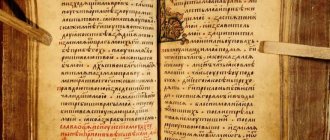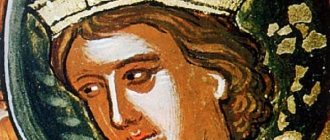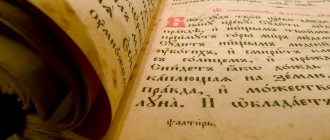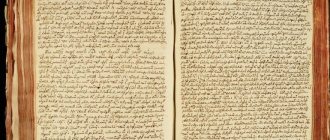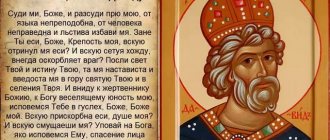Text of prayer Psalm 38
In Church Slavonic
In the end, Idithum, song to David
1 Reh: I will keep my ways, so that I will not sin with my tongue: I have kept with my mouth that the sinner should never arise before me.
2 I became dumb and humbled, and kept silent from good things, and my illness was renewed.
3 My heart is warmed within me, and a fire is kindled in my teaching. Verbs with my tongue:
4 Tell me, Lord, my end and the number of my days, what is it? Yes, I understand that I am losing it?
5 Behold, Thou hast laid down my days, and my frame is as nothing before Thee; rather, every living man is all vanity.
6 For man walks like this, but is troubled in vain: he treasures, and I do not know to whom I will gather it.
7 And now who is my patience, is it not the Lord? And my composition is from You.
8 Deliver me from all my iniquities; you have given me reproach to the fool.
9 I was dumb and did not open my mouth, as You have done.
10 Leave Thy wounds from me: from the strength of Thy hand I have disappeared.
11 In reproof of iniquity thou didst punish man, and thou didst melt away his soul like a spider: yet every man was in vain.
12 Hear my prayer, O Lord, and inspire my supplication; do not silence my tears: for I am a stranger with You and a stranger, like all my fathers.
13 Relax me, so that I may rest; first I will not even leave, nor will I be with anyone.
In Russian
To fulfillment, Idifumu. Song of David.
1 I said, “I will guard my ways, lest I sin with my tongue.” I set a guard over my mouth when the wicked stood before me.
2 I became dumb, and humbled myself, and kept silent, as one who had no good, and my pain renewed.
3 My heart was warmed within me, and a fire was kindled in my meditation. I said with my tongue:
4 “Show me, O Lord, my end, and the number of my days, what it is, so that I may know what I lack.”
5 Behold, You have measured my days in spans, and my nature is like nothing before You; However, everything is vanity, every living person.
6 Truly, like a ghost, man is transitory; he only worries in vain; saves and does not know for whom he will collect it.
7 And now, who is my patience? Isn't it the Lord? And my nature is from You.
8 Deliver me from all my iniquities: You gave me to the reproach of the fool!
9 I became dumb and did not open my mouth, because You did so.
10 Turn away Your blows from me, for I have disappeared from the strength of Your hand.
11 In reproof of iniquity You taught man and weary his soul like a web; However, every person is vanity!
12 Hear my prayer, O Lord, and listen to my petition; do not remain silent when you see my tears, for I am a sojourner with You and a stranger, like all my fathers.
13 Give me relief so that I can rest before I depart and am no longer there.
What Psalm 38 is about, its interpretation and reading rules
Psalm 38 is part of a book of the Old Testament called the Psalter. In total, it contains 150 psalms. This chant has a repentant character. One of the reasons for the appearance of this work was an actively developing serious illness that bothered the author in the last years of his life. As a result, he began to have thoughts about his imminent death.
The Story of Psalm 38
The history of the psalm begins with the uprising of the son of King David, Absalom. Having realized his sinful essence, the author, in his dying years, creates a chant with a very deep philosophical and religious meaning. He reflects on the transience of time on earth and rethinks his life path.
about the author
This psalm was created by David, the second king of Israel after Saul. The psalmist came from the family of Jesse, who lived in Bethlehem. The Bible tells us that David reigned for forty years. For seven years and six months he was sovereign in Judea. He later ruled for thirty-three years in the united kingdom of Israel with its capital in the city of Jerusalem.
Before his reign, he was an ordinary shepherd. The New Testament indicates that the Messiah, Jesus Christ, later appeared from the line of David.
History of writing
Presumably, the reason for writing Psalm 38 is the beginning of the uprising led by Absalom. During this period, along with the awareness of his own sin before God, David could also expect death at the hands of his enemies. This chant was intended for the choir, which was led by Idithum during the reign of King David.
The psalm was originally written in Hebrew. The Psalter was written in the period from the 10th to the 5th centuries BC. In the 3rd century BC. a translation was made from Hebrew into Greek. According to legend, this was an order from the Alexandrian king Ptolemy Philadelphus. The texts of the Bible were translated by 70 Jewish translators and sages, which is why this version is called the translation of the Seventy, or in Greek - the Septuagint. Then this text was already translated into Church Slavonic. The psalms were translated into Russian from Hebrew.
The first translation of the Psalter was made by the holy brothers Cyril and Methodius in 863. This was the first Old Testament book to be translated into Slavic. The first official Russian translation was published in 1876. It was carried out with the blessing and under the control of the Holy Synod. It was called Synodal. In this translation, Russians read Psalm 38 today.
The similarity of this text with Psalm 37 indicates that the hymns were written approximately in the same time period - in the last years of the life of King David.
The psalm teaches wisdom: it addresses problems about the transience of time and life.
In his declining years, David thought a lot about the concepts of “sin” and “repentance”; he regretted that during his life he spent a lot of time on sin and little on repentance.
Having reached old age and realizing the insignificance of worldly human values and aspirations, the Israeli king seeks to warn those who still have many years to live on earth. In the psalm, he calls on young people to spend their earthly journey with benefit for the soul.
Why do they read?
Today, many people find it difficult to find a new well-paid and permanent job, so Orthodox Christians are recommended to read Psalm 38.
The chant is read to the Lord God:
- granted repentance;
- strengthened a person’s strength, helped to resist enemies;
- granted an easy death.
Reading rules
- Reading time. It is best to read the chant in the morning.
- Situation. It is recommended to recite the psalm alone in good lighting. You need to prepare for reading in advance. Nothing should distract, no extraneous sounds.
- Reading. It is best to learn the chant by heart. But if this is not possible, then the text of the psalm must be written legibly on a piece of paper. The chant should be spoken in a half-whisper or into a chant. While reading, sincerity should come from the depths of the soul. Only in this way will the words of prayer be heard by God and benefit man.
- Concentrating on the text of the psalm. While reading, you need to concentrate and try to get rid of unnecessary thoughts, personal grievances and set yourself in a positive mood. The effectiveness of a prayerful appeal to God depends on how sincerely a person prayed.
Text and interpretation
In a song, David tells the believers about his serious illness. In his opinion, illness is the result of his sinfulness. Therefore, he decides not to react to injustice on the part of ill-wishers. David decided to accept God's will.
The phrases: “my heart was kindled,” “a fire was kindled in my thoughts” indicate that David was worried about the outcome of his illness. David's awareness of his sinful nature was so deep that he was sure of his imminent death. He believed that he had only a few days left to exist in the world.
In this psalm, David seeks to tell people that a person's life is nothing before God. She is like a ghost and a shadow that quickly disappears. Therefore, all human activity related to enrichment on the earthly path is pathetic. With his reflections on the topic of the meaninglessness of life, David condemned his past activities: he does not find anything necessary in it, so he watches with fear how his life ends.
The king of Israel notes that man on earth is preserved by God's mercy. David prays to the Lord for this mercy.
The phrase: “For I am a stranger and a stranger with You” says that earthly human life is a journey, because it is temporary. Life begins after the death of a person, when he finds himself in another world forever. During the earthly journey, sinful passions and attachments to earthly affairs await everyone, so a person can get lost on his difficult earthly path. Thus, a Christian needs help and mercy on this difficult path.
David recognized this omen of the Lord in his illness, which revealed to him his guilt and sinfulness. David prays to the Lord God for mercy, so that He will grant him this mercy.
Video
This video presents the text of Psalm 38 in Russian.
History of writing
The exact history of the writing of the text of Psalm 38 is not known, but it is assumed that King David created the song already at the end of his life. At that moment he thought about the finitude of life. He asks the Lord to answer how long he has left to leave this life without regret. When the end of life is approaching, you want to finish all things, correct mistakes, resolve conflicts, end disputes. These thoughts of the king formed the basis of a song-reflection, which was inspired by the wisdom that came over the years.
Content
The theme of the Psalm is God's displeasure with sin. (1–11) and the sufferings and prayers of the psalmist. (12–22).[3][4] The psalm opens with a prayer, David felt as if he had been forgotten about his God. He then periodically moves from lamentation to hope.[5]Benjamin Weiss o[6]
Written late in Davey's life, [7] although Coffman believes it was early in David's reign. throughout his life, about the relationship he had with his Lord[10] before he left.
When to read Psalm 38?
In churches, during services, Psalm 38 is sung in the Old Church Slavonic version. At home, you are allowed to read Psalm 38 in Russian for better understanding. They turn to the song in hopeless situations, in moments of despondency and despair. Prayer is repentance and hope for a bright future. The psalm is also recommended for reading for those who have lost their jobs.
When reading a prayer, you need to be focused on the words and think only about your request so that it is heard. It is advisable to read Psalm 38 in front of icons with a lit candle or lamp. The request must be sincere, so you should not use a prayer if its text is not close in spirit and does not suit the current situation in content.
Recommendations
- Matthew Henry, Commentary on Psalm 39.
- Parallel Latin/English Psalter/Psalm 37 (38) Archived 2017-05-07 in the Wayback Machine Mediumist.net
- Matthew HenryS Brief comment
- John Wesley Explanatory Notes.
- Charles H. Spurgeon, Treasury of David.
- Benjamin Weiss.
- Christopher Love
- Coffman's Bible Commentary.
- Charles H. Spurgeon, Treasury of David.
- Calvin's Commentaries, vol. 9: Psalms, part II, tr. John King, [1847–1850].]
- The Complete Artscroll Siddur page 129
- D'après le Complete Artscroll Siddur
, collection of the first children. - Kirkpatrick, A.F. (1901). The Book of Psalms: With Introduction and Notes
. Cambridge Bible for Schools and Colleges. Book IV and V: Psalms XC-CL. Cambridge: University Press. item 838. Received February 28, 2019. - Regle de Saint-Benoit
, translation par Prosper Guéranger, n. 46, Abbaye Saint-Pierre de Solesmes, re-impression - https://www.abbaye-montdescats.fr/?page_id=1887
- Psautier latin-français du bréviaire monastique, 1938, p. 149.
- https://torahofyeshuah.blogspot.com/2015/07/book-of-meqabyan-i-iii.html
- Three Psalms by Josquin Despres: 1935 Edition International Music Library Project
- Gottfried Vaupelius (1682). Neu Leipziger Gesangbuch
, pp.648–651. - Cornelius Becker (1602). Der Psalter Dauids Gesangweis
, “Der XXXVIII. Psalm" - Zahn, Johannes (1890). Die Melodien der deutschen evangelischen Kirchenlieder
(in German).
III
. Gütersloh: Bertelsmann. pp.131–132, 558–559. - Score of Herr straf mich nicht in Deinem Zorn, SWV 135, Heinrich Schütz in the Choral Public Library (ChoralWiki)
Interpretation
King David in the song conveys his thoughts in moments of sorrow from the approach of death, and the interpretation of Psalm 38 is based on this.
- Verses 1-2 are discussions about sins, lies and inappropriate words, calmness when attacked by enemies and suppression of feelings.
- Verses 3-4 – before death, a fire flares up in the soul that cannot be quenched. This is why the question arises about the day of death.
- Verses 5-7 - the author understands that his life is finite and measured, so he wants to know how much time is allotted to complete all the affairs in this world.
- Verses 8-11 - King David surrenders himself to the power of God, understands that the Lord sends illnesses and trials to him and salvation is in His hands.
- Verse 12 is the thoughts of a tired man who has gone through a lot and is now asking for help.
- Verse 13 is a request for God’s mercy, for mercy and deliverance from suffering before death.
Despite the laws of God and the numerous miracles that the Lord sent to people, they continue to stray from the right path, cling to material wealth, putting them above spiritual ones, although they are of no value to God. King David in the text of Psalm 38 asks the Lord for the mercy of leaving the world freed from all earthly problems and cleansed of sins, since only this will bring long-awaited peace.
( 4 ratings, average: 4.00 out of 5)
Meaning and Interpretation of Psalm 38
Psalm 38 continues the theme of the previous song, where King David, during a period of grief, perhaps it was an illness, feels the approach of death and begs the Lord for forgiveness of sins in the name of saving his soul.
In the first verses the psalmist talks about:
- sins;
- taming your tongue;
- the ability not to react to provocative actions of enemies;
- suppressing your feelings.
It is difficult for a person to fight with his own strength the fire that flares up in the heart when thoughts of approaching death come.
In verses 5-7, King David begs God to show how many inches of life he has left to go through, understanding the vanity of human existence.
Important! The author emphasizes that it is important for him to know the time of departure to another world in order to have time to repent, put things in order, in order to appear before the Almighty with a pure soul.
Human life is illusory and vain, people collect wealth on earth, and death will come in an instant, no one knows who will get everything, but this will no longer matter to the deceased himself.
Also about other psalms:
- Psalm of David 70
- Psalm of David 4
- Psalm of David 5
How important it is, like King David, to realize your sins and not give yourself over to the desecration of a crazy world.
Psalm 38 gives hope for a successful resolution of problems
In verse 10, the psalmist proclaims complete submission to the Creator, and then again there is a prayer for mercy, for under the blows of God the king was exhausted in illness.
David remembered his sins and accepted all punishments, understanding that in this way the Creator was protecting us from mortal harm.
Verse 12 speaks of the weariness of a weary man who speaks of his vanity.
No matter how much the Creator helped people, they still continue to fuss over things that are fragile and have no value in God’s eyes.
The final chords of Psalm 38, David’s prayers are filled with an exclamation of hope that by the mercy and condescension of the Lord we keep man on this earth, having hope for eternal life.
We are all wanderers and strangers in earthly existence, our home is in Heaven. A person feels secure only under the protection of the Creator, who will guide him through life past temptations and evil; it is impossible for a weak person to do this on his own.
King David appeals to God for mercy, the granting of liberation from earthly problems and cleansing from sins in order to leave this earth in peace.
Links[edit]
- ↑
Matthew Henry, Commentary on Psalm 39. - ↑
Parallel Latin/English Psalter/Psalmus 37 (38) Archived May 7, 2022 at the Wayback Machine Medievalist.net - Matthew Henry's Condensed Commentary
- John Wesley's Explanatory Notes.
- Charles H. Spurgeon, David's Treasury.
- ↑
Benjamin Weiss - Christopher Love
- Coffman's Commentaries on the Bible.
- Charles H. Spurgeon, David's Treasury.
- Calvin's Commentaries, Vol. 9: Psalms, part II, tr. John King, [1847–1850].]
- The Complete Artscroll Siddur page 129
- D'après les Complete Artscroll Siddur
, collection of des prières juives. - Kirkpatrick, A. F. (1901). The Book of Psalms: With Introduction and Notes. Cambridge Bible for Schools and Colleges. Book IV and V: Psalms XC-CL. Cambridge: University Press. item 838. Retrieved February 28, 2022.
- Règle de Saint Benoit
, Traduction couple Prosper Gueranges, p. 46, Abbaye Saint-Pierre de Solesmes, reimpression - https://www.abbaye-montdescats.fr/?page_id=1887
- Psautier latin-francais du bréviaire monastique, 1938p. 149.
- https://torahofyeshuah.blogspot.com/2015/07/book-of-meqabyan-i-iii.html
- ↑
Three Psalms by Josquin Despres: 1935 edition in the International Music Score Library Project - Gottfried Vopelius (1682). Neu Leipziger Gesangbuch
, pp. 648–651. - Cornelius Becker (1602). Der Psalter Dauids Gesangweis
, “Der XXXVIII. Psalm" - Zahn, Johannes (1890). Die Melodien der deutschen evangelischen Kirchenlieder
(in German).
III
. Gütersloh: Bertelsmann. pp. 131 – 132, 558–559. - Set of Herr STRAF Mich Nicht in Deinem Zorn, SWV 135, by Schütz in the Public Domain Choral Library (ChoralWiki)
